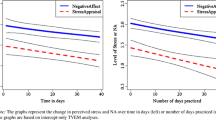Abstract
The effectiveness of two treatments for reducing stress associated with the Type A behavior pattern was evaluated. One treatment, Stress Management Training, was a replication of a previously reported treatment. The Cognitive Therapy treatment, based on the principles of rational-emotive therapy, was designed specifically for this study. Both treatment groups were compared with a waiting list control group on several self-report and physiological measures. For subjects who initially had the highest degree of Type A characteristics, Cognitive Therapy was more effective than Stress Management Training or no treatment in reducing self-perceived levels of Type A behavior. Both treatments reduced self-reported anxiety levels, and were more effective than no treatment. Neither treatment reduced subjects' cholesterol levels or blood pressure.
Similar content being viewed by others
Reference Notes
Suinn, R. M.Manual, Anxiety Management Training (AMT). Treatment manual, 1977. (Available from Rocky Mountain Behavioral Sciences Institute, P.O. Box 1066, Ft. Collins, Colorado 80522)
Jenkins, C. D. Personal communication, October 18, 1977.
Suinn, R. M.Anxiety management training. Treatment package, two cassette tapes and therapist instructions, 1972. (Available from Rocky Mountain Behavioral Sciences Institute, P.O. Box 1066, Ft. Collins, Colorado 80522)
References
Bloom, L. J., & Suinn, R. M. Anxiety management training for pattern A behavior.Journal of Behavioral Medicine 1978,1 25–36.
Bortner, R. W. A short rating scale as a potential measure of pattern A behavior.Journal of Chronic Diseases 1969,22 87–91.
Ellis, A.The essence of rational psychotherapy: A comprehensive approach to treatment. New York: Institute for Advanced Study in Rational Psychotherapy, 1970.
Ellis, A.Humanistic psychotherapy. New York: Julian Press, 1973.
Friedman, M.Pathogenesis of coronary artery disease. New York: McGraw-Hill, 1969.
Friedman, M. Modifying “Type A” behavior in heart attack patients.Primary Cardiology 1978,4 9–13.
Friedman, M., & Rosenman, R. H. Association of specific overt behavior pattern with blood and cardiovascular findings: blood cholesterol level, blood clotting time, incidence of arcus senilis, and clinical coronary artery disease.Journal of the American Medical Association 1959,169 1286–1296.
Friedman, M., & Rosenman, R. H.Type A behavior and your heart. New York: Knopf, 1974.
Glass, D. C. Stress, behavior patterns, and coronary disease.American Scientist 1977,65 177–187.
Goldfried, M. R., Decenteceo, E. T., & Weinberg, L. Systematic rational restructuring as a self-control technique.Behavior Therapy 1974,5 247–254.
Jacobsen, E.Progressive relaxation. Chicago: University of Chicago Press, 1938.
Jenkins, C. D. Recent evidence supporting psychologic and social risk factors for coronary disease.New England Journal of Medicine 1976,294 987–994; 1033–1038.
Jenkins, C. D., Rosenman, R. H., & Friedman, M. Replicability of rating the coronary-prone behavior pattern.British Journal of Preventative and Social Medicine 1968,22 16–22.
Jenkins, C. D., Rosenman, R. H., & Zyzanski, S. J.The Jenkins activity survey for health prediction, Form B. Boston: Authors, 1972.
Jenni, M. A.A comparison of stress management training and cognitive therapy in the treatment of persons manifesting the coronary-prone behavior pattern. Unpublished doctoral dissertation, University of Montana, 1978.
Richardson, F. C., & Suinn, R. M. Effects of two short-term desensitization methods in the treatment of test anxiety.Journal of Counseling Psychology 1974,21 457–458.
Rosenman, R. H., & Friedman, M. Association of specific overt behaviour pattern in females with blood and cardiovascular findings.Circulation 1961,24 1173–1184.
Rosenman, R. H., & Friedman, M. Behavior patterns, blood lipids, and coronary heart disease.Journal of the American Medical Association 1963,184 934–938.
Rosenman, R. H., Friedman, M., Straus, R., Wurm, M., Kositchek, R., Hahn, W., & Werthessen, N. T. A predictive study of coronary heart disease.Journal of the American Medical Association 1964,189 15–22 (Appendix).
Spielberger, C. D., Gorsuch, R. L., & Lushene, R. E.State-trait anxiety inventory. California: Consulting Psychologists Press, 1970.
Suinn, R. M. Removing emotional obstacles to learning and performance by visuo-motor behavior rehearsal.Behavior Therapy 1972,3 308–310. (a)
Suinn, R. M. Behavior rehearsal training for ski racers.Behavior Therapy 1972,3 519–520. (b)
Suinn, R. M. The cardiac stress management program for type A patients.Cardiac Rehabilitation 1975,5 13–16.
Suinn, R. M. Visuo-motor behavior rehearsal for adaptive behavior. In J. Krumboltz & C. Thoresen (Eds.),Counseling methods. New York: Holt, Rinehart & Winston, 1976.
Suinn, R. M., Brock, L., & Edie, C. Behavior therapy for Type A patients.American Journal of Cardiology 1975,36 269.
Suinn, R. M., & Richardson, F. C. Anxiety management training: A nonspecific behavior therapy program for anxiety control.Behavior Therapy 1971,2 498–510.
Thurstone, L. L.Thurstone temperament schedule. Chicago: Science Research Associates, 1950.
Winer, B. J.Statistical principles in experimental design. New York: McGraw-Hill, 1971.
Author information
Authors and Affiliations
Rights and permissions
About this article
Cite this article
Jenni, M.A., Wollersheim, J.P. Cognitive Therapy, Stress Management Training, and the Type A behavior pattern. Cogn Ther Res 3, 61–73 (1979). https://doi.org/10.1007/BF01172720
Issue Date:
DOI: https://doi.org/10.1007/BF01172720




